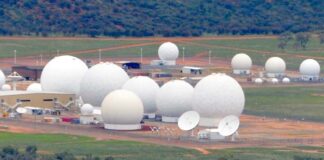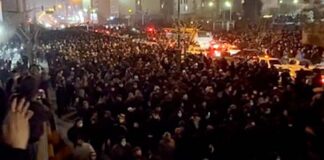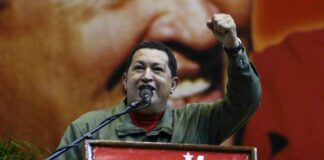US President Trump has issued a series of military threats as he pursues gunboat diplomacy against North Korea.
“North Korea is looking for trouble,” Trump wrote on Twitter. His Vice President Mike Pence warned during a visit to South Korea that the “era of strategic patience” with North Korea over its nuclear program was over.
The US has ordered an aircraft carrier and its strike group, which includes a cruiser and two destroyers, to patrol the Korean coast. It is even considering shooting down future missile tests.
The North responded by threatening to launch a test missile every week and saying “thermonuclear war may break out at any moment.”
China has been the main sponsor of the North Korean regime ever since the Soviet Union fell apart. Trump wants to put pressure on China to impose fresh economic sanctions on North Korea to force it to give up its nuclear weapons program.
But if China let the North Korean regime fall it could face the prospect of a new pro-US regime right on its doorstep and hundreds of thousands of refugees crossing into China. Trump’s real problem here is with China itself, which is the main military and economic competitor to the US in the world today.
The US sees the ongoing demonisation of North Korea as a way to justify its presence in Asia as part of its “pivot” to the region aimed at encircling China.
The US is in the process of installing a missile “defence” shield in South Korea, which China claims is actually aimed at its territory and built for the purpose of containing China’s rise.
But it appears that China is getting tired of having to deal with the diplomatic crises. To try to rein it in, it recently began an embargo on North Korean coal, which will have a huge impact on the North Korean economy.
Trump has been saying more positive things about his Chinese counterpart in recent days, so the US and China might be moving closer to some sort of deal on the question of North Korea.
US hypocrisy
It has long been the hypocritical policy of the US that they get to retain their nuclear weapons of mass destruction (WMDs) while no other country can develop them.
Lacking other energy reserves, North Korea has used nuclear power plants since 1974. Since economic aid from Russia ended in the early 1990s with the collapse of the Russian empire it has faced severe economic crisis.
In the 1990s the regime hit on the idea of developing a nuclear weapons program as a bargaining chip to try to extract aid and other concessions from the West.
In exchange for North Korea disbanding its weapons program, the US agreed in 1994 to help build two new proliferation-resistant nuclear reactors and provide food and oil aid.
There was also agreement to move towards full normalisation of political relations and end the sanctions on North Korea that had continued since the end of the Korean War in the 1950s.
But the US never kept its side of the bargain. The reactors were never completed and the US refused to drop its sanctions on the country.
It was only then that the regime resumed its missile testing. After George W Bush ramped up the belligerence against it, it also resumed developing nuclear weapons.
In 2002 US President Bush declared North Korea, along with Iran and Iraq, to be part of an ‘axis of evil’ which was developing WMDs and harbouring terrorists.
US and South Korean troops regularly engage in military preparations that simulate a pre-emptive attack and invasion of the North. With this sort of belligerence, it is understandable why the North would pursue nuclear weapons and use them as a bargaining chip.
In the last year it has tested two nuclear bombs and a number of missiles.
Socialists oppose all nuclear weapons, including the North Korean regime’s potential development and use of them. But the idea that the US is seeking peace through its sabre-rattling, which threatens war between nuclear-armed countries, is obviously ridiculous.
During the Korean War the US military unleashed a ferocious campaign of napalm and carpet-bombing on Korean cities, murdering over 3 million people. It is not a force for peace in the region, but rather a belligerent imperialist bully.
We should oppose their recent escalations and call for Australia’s military alliance with the US to be axed.
By Miro Sandev





